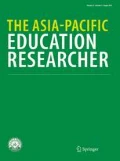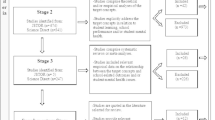Abstract
Positive education is the application of positive psychology principles to the education domain. Relative to positive psychology, positive education has not received a great deal of theoretical and empirical attention. In addition, there is a significant dearth of positive education theory and research focusing on students in the Asian region. This article explores positive education, its links to positive psychology, and its relevance and importance to wellbeing and learning in the Asian context. Building on the series of studies in this Special Issue, the article then outlines critical conceptual, measurement, and research design considerations for positive education research going forward.
Similar content being viewed by others
References
Australian Department of Prime Minister and Cabinet. (2012). Australia in the Asian century: White paper. Canberra: Australian Government Publishing.
Bernardo, A. B., Salanga, M. G. C., Khan, A., & Yeung, S. S. (2015). Internal and external loci-of-hope predict use of individual and collaborative learning strategies: Evidence from university students in four Asian cities. The Asia-Pacific Education Researcher. doi:10.1007/s40299-015-0249-y.
Block, J. (2000). Three tasks for personality psychology. In L. R. Bergman, R. B. Cairns, L.-G. Nilsson, & L. Nystedt (Eds.), Developmental science and the holistic approach (pp. 155–164). Mahwah, NJ: Erlbaum.
Chen, C. (2016). The role of resilience and coping styles in subjective well-being among Chinese university students. The Asia-Pacific Education Researcher. doi:10.1007/s40299-016-0274-5.
Datu, J. A. D., & Valdez, J. P. M. (2016). Psychological capital predicts academic engagement and well-being in Filipino high school students. The Asia-Pacific Education Researcher. doi:10.1007/s40299-015-0254-1.
Eaton, M. J., & Dembo, M. H. (1997). Differences in the motivational beliefs of Asian American and non-Asian students. Journal of Educational Psychology, 89, 433–440. doi:10.1037/0022-0663.89.3.433.
Fan, W., Zhou, M., Cheung, F. M., Zhang, J., & Zhou, X. (2016). Contributions of resilience to mental health in Chinese secondary school students at different disaster stress levels. The Asia-Pacific Education Researcher. doi:10.1007/s40299-015-0266-x.
Ganotice Jr, F. A., Yeung, S. S., Beguina, L. A., & Villarosa, J. B. (2016). In Search for H.E.R.O Among Filipino Teachers: The Relationship of Positive Psychological Capital and Work-Related Outcomes. The Asia-Pacific Education Researcher. doi:10.1007/s40299-015-0267-9.
Gill, I., & Kharas, H. (2007). An East Asian renaissance: Ideas for economic growth. Washington DC: World Bank. doi:10.1596/978-0-8213-6747-6.
Hau, K. T., & Ho, I. T. (2008). Editorial: Insights from research on Asian students’ achievement motivation. International Journal of Psychology, 43, 865–869. doi:10.1080/00207590701838030.
Hau, K. T., & Ho, I. T. (2010). Chinese students’ motivation and achievement. In M. H. Bond (Ed.), The Oxford handbook of Chinese psychology (pp. 187–204). New York, NY: Oxford University Press. doi:10.1093/oxfordhb/9780199541850.013.0014.
Henrich, J., Heine, S. J., & Norenzayan, A. (2010). Most people are not WEIRD. Nature, 466, 29. doi:10.1038/466029a.
Hickey, D. T. (2003). Engaged participation versus marginal nonparticipation: A stridently sociocultural approach to achievement motivation. The Elementary School Journal, 103, 401–429. doi:10.1086/499733.
Hickey, D. T., & McCaslin, M. (2001). Comparative and sociocultural analyses of context and motivation. In S. S. Volet & S. Järvelä (Eds.), Motivation in learning contexts: Theoretical and methodological implications (pp. 33–56). Amsterdam: Pergamon/Elsevier.
Hu, Y., & Gan, Y. (2008). Development and psychometric validity of the resilience scale for Chinese adolescents. Acta Psychologica Sinica, 40, 902–912. doi:10.3724/SP.J.1041.2008.00902.
Ji, M., Tao, L., & Zhu, T. (2016). Piloting forgiveness education: A comparison of the impact of two brief forgiveness education programmes among Chinese college students. The Asia-Pacific Education Researcher. doi:10.1007/s40299-016-0273-6.
King, R. B., Caleon, I. S., Tan, J. P-L., & Ye, S. (2016). Positive education in Asia. The Asia-Pacific Education Researcher. doi:10.1007/s40299-016-0292-3.
Lazarus, R. S. (2003). Does the positive psychology movement have legs? Psychological Inquiry, 14, 93–109. doi:10.1207/S15327965PLI1402_02.
Legge, J. (1971). Confucian Analects (trans.). New York: Dover Publishing.
Liau, A. K., Neihart, M. F., Teo, C. T., & Lo, C. H. (2016). Effects of the best possible self activity on subjective well-being and depressive symptoms. The Asia-Pacific Education Researcher. doi:10.1007/s40299-015-0272-z.
Martin, A. J., Collie, R. J., Mok, M., & McInerney, D. M. (2016a). Personal best (PB) goal structure, individual PB goals, engagement, and achievement: A study of Chinese- and English-speaking background students in Australian schools. British Journal of Educational Psychology, 86, 75–91. doi:10.1111/bjep.12092.
Martin, A. J., & Hau, K.-T. (2010). Achievement motivation amongst Chinese and Australian school students: Assessing differences of kind and differences of degree. International Journal of Testing, 10, 274–294. doi:10.1080/15305058.2010.482220.
Martin, A.J., Yu, K., Ginns, P., & Papworth, B. (2016). Young people’s academic buoyancy and adaptability: A cross-cultural comparison of China with North America and the United Kingdom. Submitted for publication.
Martin, A. J., Yu, K., & Hau, K.-T. (2014). Motivation and engagement in the ‘Asian Century’: A comparison of Chinese students in Australia, Hong Kong, and Mainland China. Educational Psychology: An International Journal of Experimental Educational Psychology, 34, 417–439. doi:10.1080/01443410.2013.814199.
Maulana, R., Helms-Lorenz, Y., Irnidayanti, M., & van der Grift, W. (2016). Autonomous motivation in the Indonesian classroom: Relationship with teacher behavior through the lens of self-determination theory. The Asia-Pacific Education Researcher. doi:10.1007/s40299-016-0282-5.
McInerney, D. M. (2006). The motivational profiles and perceptions of schooling of Asian students in Australia. Malaysian Journal of Learning and Instruction, 3, 1–31.
Miller, A. (2008). A critique of positive psychology—or ‘the new science of happiness’. Journal of Philosophy of Education, 42, 591–608. doi:10.1111/j.1467-9752.2008.00646.x.
Ng, T. K., & Ye, S. (2015). Human values and university life satisfaction among Hong Kong Chinese university students: A cross-lagged panel analysis. The Asia-Pacific Education Researcher. doi:10.1007/s40299-015-0255-0.
Nolen, S. B. (2007). Young children’s motivation to read and write: Development in social contexts. Cognitive and Instruction, 25, 219–270. doi:10.1080/07370000701301174.
Norem, J. (2008). The positive power of negative thinking. New York: Basic Books.
Salili, F., Lai, M. K., & Leung, S. S. K. (2004). The consequences of pressure on adolescent students to perform well in school. Hong Kong Journal of Paediatrics, 9, 329–336.
Segall, M. H., Lonner, W. J., & Berry, J. W. (1998). Cross-cultural psychology as a scholarly discipline: On the flowering of culture in behavioral research. American Psychologist, 53, 1101–1110. doi:10.1037/0003-066X.53.10.1101.
Seligman, M. E., Ernst, R. M., Gillham, J., Reivich, K., & Linkins, M. (2009). Positive education: Positive psychology and classroom interventions. Oxford Review of Education, 35, 293–311. doi:10.1080/03054980902934563.
Sundararajan, L. (2005). Happiness donut: A Confucian critique of positive psychology. Journal of Theoretical and Philosophical Psychology, 25, 35–60. doi:10.1037/h0091250.
Turner, J. C., & Meyer, D. K. (2000). Studying and understanding the instructional contexts of classrooms: Using our past to forge our future. Educational Psychologist, 35, 69–85. doi:10.1207/S15326985EP3502_2.
Villavicencio, F. T., & Bernardo, A. B. (2015). Beyond math anxiety: Positive emotions predict mathematics achievement, self-regulation, and self-efficacy. The Asia-Pacific Education Researcher. doi:10.1007/s40299-015-0251-4.
World Bank (2006). Critical discussion on education. Working Paper Series no. 2007-2, Washington, DC.
Xie, Q., Fan, W., Wong, P., & Cheung, F. M. (2016). Personality and parenting style as predictors of life satisfaction among Chinese secondary students. The Asia-Pacific Education Researcher. doi:10.1007/s40299-015-0271-0.
Yu, B., & Jin, L. (2016). The relations among family functioning, class environment, and gratitude in chinese elementary school students. The Asia-Pacific Education Researcher. doi:10.1007/s40299-016-0280-7.
Yu, K., & Martin, A. J. (2014). Personal best (PB) and ‘classic’ achievement goals in the Chinese context: Their role in predicting academic motivation, engagement, and buoyancy. Educational Psychology: An International Journal of Experimental Educational Psychology, 34, 635–658. doi:10.1080/01443410.2014.895297.
Zhang, Y. (2016). Making students happy with wellbeing-oriented education: Case study of a secondary school in China. The Asia-Pacific Education Researcher. doi:10.1007/s40299-016-0275-4.
Author information
Authors and Affiliations
Corresponding author
Rights and permissions
About this article
Cite this article
Martin, A.J. Positive Education in Asia and Beyond. Asia-Pacific Edu Res 25, 493–498 (2016). https://doi.org/10.1007/s40299-016-0291-4
Published:
Issue Date:
DOI: https://doi.org/10.1007/s40299-016-0291-4




